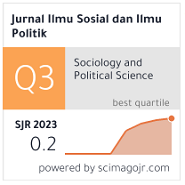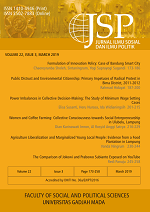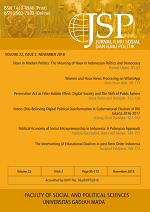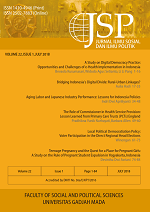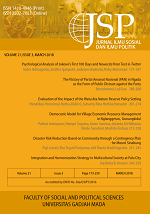Journalism and Journalists’ Vulnerability during COVID-19 Pandemic in Indonesia
Abdul Fadli Kalaloi(1*), Rana Akbari Fitriawan(2), Reni Nuraeni(3)
(1) Communication Science Study Program, Telkom University, Indonesia
(2) Communication Science Study Program, Telkom University, Indonesia
(3) Communication Science Study Program, Telkom University, Indonesia
(*) Corresponding Author
Abstract
Journalists are among the workers who continue to engage in journalism activities like news covering despite the COVID-19 pandemic. Journalists facing paradoxical conditions between being productive in news covering and the dangers of virus transmission that can infect at any time. In other hand, journalists need support equipment facilities to avoid virus transmission during news covering process. Moreover, various media companies announce layoffs and salary cuts by asserting business uncertainty. This study aims to describe journalists’ vulnerability within journalism activity and journalist as occupation during the COVID-19 pandemic in 2020. This study was conducted with a qualitative method by analyzing the primer data from 50 journalist various region and representatives of journalist’s association in Indonesia. Furthermore, we analyze secondary data that provided officially by Alliance of Independent Journalists Indonesia. Authors found that the lack of health insurance, support for preventing the spread of COVID-19, unilateral dismissals by media institutions, and salary cuts place journalists in a difficult position. Aspects of journalism activities that run normally without institutional or structural support legitimize the vulnerabilities experienced by journalists in Indonesia.
Keywords
Full Text:
PDFReferences
Allen, M. (2017). The SAGE Encyclopedia of Communication Research Methods. In The SAGE Encyclopedia of Communication Research Methods. Sage Publications, Inc. https://doi.org/10.4135/9781483381411
Alwang, J., Siegel, P. B., Jørgensen, S. L., & Tech, V. (2001). Series Vulnerability : A View From Different Disciplines. In Social Protection Discussion Paper . World Bank. https:// citeseerx.ist.psu.edu/viewdoc/download?doi=10.1.1.195.270&rep=rep1&type=pdf
Anthony, K. E., & Sellnow, T. L. (2011). Information Acquisition, Perception, Preference, and Convergence by Gulf Coast Residents in the Aftermath of the Hurricane Katrina Crisis. Argumentation and Advocacy, 48(2). https://doi.org/10.1080/00028533.2011.11821756
Birkmann, J. (2006). Measuring vulnerability to promote disaster-resilient societies : Conceptual frameworks and definitions. In J. Birkmann (Ed.), Measuring Vulnerability to Natural Hazards; Towards Disaster Resilient Societies (2nd ed., Vol. 01, pp. 9–54). United Nation University Press. https:// collections.unu.edu/eserv/UNU:2880/ n9789280812022_text.pdf
Christians, C. G., Glasser, T. L., McQuail, D., Nordenstreng, K., & White, R. A. (2009). Normative theories of the media: Journalism in democratic societies. In Normative Theories of the Media: Journalism in Democratic Societies. https://doi.org/10.5860/choice.47-1837
Creswell, W. J., & Creswell, J. D. (2018). Research Design: Qualitative, Quantitative adn Mixed Methods Approaches. Sage Publications, Inc.
Daniel, B. (2010). Concepts of Adversity, Risk, Vulnerability and Resilience: A Discussion in the Context of the ‘Child Protection System.’ Social Policy and Society, 9(2). https://doi.org/10.1017/ s1474746409990364
Dunwoody, S. (2020). Science journalism and pandemic uncertainty. Media and Communication, 8(2), 471–474. https://doi. org/10.17645/mac.v8i2.3224
Edmond, C. (2021). Everything changed overnight”: 4 journalists share their pandemic experiences. 19 August 2021. https://www.weforum.org/agenda/2021/08/covid-19- pandemic-misinformation-journalism/
Eriyanto, & Ali, D. J. (2020). Discourse network of a public issue debate: A study on covid-19 cases in indonesia. Jurnal Komunikasi: Malaysian Journal of Communication, 36(3), 209–227. https://doi.org/10.17576/JKMJC-2020-3603-13
Estella, P. G. (2020). Journalism competence and the COVID-19 crisis in Southeast Asia. Pacific Journalism Review: Te Koakoa, 26(2). https://doi.org/10.24135/pjr.v26i2.1132
Frenkel, S., Alba, D., & Raymond, Z. (2020). Surge of Virus Misinformation Stumps Facebook and Twitter. The New York Times. https://www.nytimes.com/2020/03/08/ technology/coronavirus-misinformation- social-media.html
Goodin, R. E. (1985). Protecting the Vulnerable:A Re-Analysis of our Social Responsibilities. University of Chicago Press.
Hanitzsch, T. (2005). Journalists in indonesia: Educated but timid watchdogs. Journalism Studies , 6 (4). https://doi. org/10.1080/14616700500250396
IFJ, I. F. of J. (2020). Exposed: The crisis facing journalism in the face of Covid-19. April, 30. https://www.ifj.org/media-centre/news/ detail/category/press-releases/article/ exposed-the-crisis-facing-journalism-in- the-face-of-covid-19.html
Kahneman, D., & Tversky, A. (1982). Variants of uncertainty. Cognition, 11(2). https://doi. org/10.1016/0010-0277(82)90023-3
Kalaloi, A. F. (2020). Delegitimation of single-muxpolicy on re-regulati on process of indonesian broadcasting bill in media framing. Jurnal Komunikasi: Malaysian Journal of Communication , 36(3), 49–66. https://doi.org/10.17576/JKMJC-2020-3603-04
Kampourakis, K., & McCain, K. (2019). How Uncertainty Makes Science Advance. In Uncertainty. Oxford University Press. https://doi.org/10.1093/oso/9780190871666.003.0015
La, V. P., Pham, T. H., Ho, M. T., Nguyen, M. H., Nguyen, K. L. P., Vuong, T. T., Nguyen, H. K. T., Tran, T., Khuc, Q., Ho, M. T., & Vuong, Q. H. (2020). Policy response, social media and science journalism for the sustainability of the public health system amid the COVID-19 outbreak: The vietnam lessons. Sustainability (Switzerland), 12(7). https://doi. org/10.3390/su12072931
Lewis, S. C. (2020). The Objects and Objectives of Journalism Research During the Coronavirus Pandemic and Beyond. Digital Journalism, 8(5), 681–689. https://doi.org/10.1080/21670811.2020.1773292
Lowrey, W. (2006). Mapping the journalism-blogging relationship. Journalism, 7(4), 477–500. https://doi. org/10.1177/1464884906068363
Manan, A. (2020a). AJI: Hentikan Kesewenang- wenangan Perusahaan Media di Tengah Pandemi. In October, 26. https://aji.or.id/read/press-release/1133/aji-hentikan- kesewenang-wenangan-perusahaan- media-di-tengah-pandemi.html
Manan, A. (2020b). AJI Mengingatkan Tanggungjawab Perusahaan Media soal Kasus Covid-19. AJI.or.Id; Aliansi Jurnalis Independen. https://aji.or.id/read/ press-release/1140/aji-mengingatkan- tanggungjawab-perusahaan-media-soal- kasus-covid-19.html
Miles, M. B., Huberman, M., & Saldana, J. (2020). Qualitative Data Analysis-A Methods Sourcebook -4th edition. In SAGE (Vol. 53, Issue 9).
Mohamad, E., & Azlan, A. A. (2020). COVID-19 and communication planning for health emergencies. In Jurnal Komunikasi: Malaysian Journal of Communication (Vol. 36, Issue 1).
Murti, M. W. (2020). First COVID-19 Wave in Indonesia May Peak at End of June: Epidemiologist. Tempo. https://en.tempo. co/read/1469960/first-covid-19-wave-in-indonesia-may-peak-at-end-of-june- epidemiologist
Napoli, P. M. (2020). Connecting Journalism and Public Policy: New Concerns and Continuing Challenges. Digital Journalism,8(6), 691–703. https://doi.org/10.1080/21670811.2020.1775104
Ni’matun, N. (2020). Dewan Pers Harus Melindungi Pekerja Media Dari PHK Semena-mena. AJI. or.Id; Aliansi Jurnalis Independen. https:// aji.or.id/read/press-release/1090/dewan- pers-harus-melindungi-pekerja-media- dari-phk-semena-mena.html
Olsen, R. K., Pickard, V., & Westlund, O. (2020). Communal News Work: COVID-19 Calls for Collective Funding of Journalism. Digital Journalism, 8(5), 673–680. https://doi.org/10.1080/21670811.2020.1763186
Parahita, G. D. (2020). Lima Dimensi Jurnalisme Krisis Covid-19 di Indonesia. In W. Mas’udi;Poppy S Winanti (Ed.), Tata Kelola Penanganan Covid-19 di Indonesia (p. 321).
Parahita, G. D., & Nyarwi, A. (2020). What dampen the Indonesian’s Journalist freedom and safeness in the Post-Soeharto New Order? In S. Jamil (Ed.), Handbook of Research on Combating Threats to Media Freedom and Journalist Safety. (pp. 83–105). IGI Global.
Perreault, M. F., & Perreault, G. P. (2021). Journalists on COVID-19 Journalism: Communication Ecology of Pandemic Reporting. American Behavioral Scientist, 65(7), 976–991. https://doi.org/10.1177/0002764221992813
Pickard, V. (2020). Democracy without Journalism? In Democracy without Journalism? Oxford University Press. https://doi.org/10.1093/ oso/9780190946753.001.0001
Reynolds, B., & Seeger, M. W. (2005). Crisis and emergency risk communication as an integrative model. Journal of Health Communication, 10(1), 43–55. https://doi.org/10.1080/10810730590904571
Surugiu, R. (2013). Labor Conditions of Young Journalists in Romania: A Qualitative Research. Procedia - Social and Behavioral Sciences, 81, 157–161. https://doi.org/10.1016/j.sbspro.2013.06.405
Warner, J. (2007). Community care, risk and the shifting locus of danger and vulnerability in mental health. In Health, Risk and Vulnerability (p. 18). Routledge. https://doi. org/10.4324/9780203933497
Weissert, W., & Leimire, J. (2020). Face masks make a political statement in era of coronavirus. Apnews.Com, May 8. https://apnews.com/article/virus-outbreak-donald-trump-ap-top-news-politics-health-7dce310db6e85b31d735e81d0af6769c
Wishart, G. (2003). The sexual abuse of people with learning difficulties: Do we need a social model approach to vulnerability? The Journal of Adult Protection, 5(3), 14–27. https://doi.org/https://doi.org/10.1108/14668203200300021
Yin, R. K. (2018). Case Study Research and Applications Design and Methods Sixth Edition (Vol. 21, Issue 1). Sage Publications, Inc.
Zuckerberg, M. (2020). Status Update April, 16. https://web.facebook.com/zuck/posts/10111806366438811?_rdc=1&_rdr
Article Metrics
Refbacks
- There are currently no refbacks.
Copyright (c) 2023 Jurnal Ilmu Sosial dan Ilmu Politik

This work is licensed under a Creative Commons Attribution-NonCommercial-NoDerivatives 4.0 International License.







